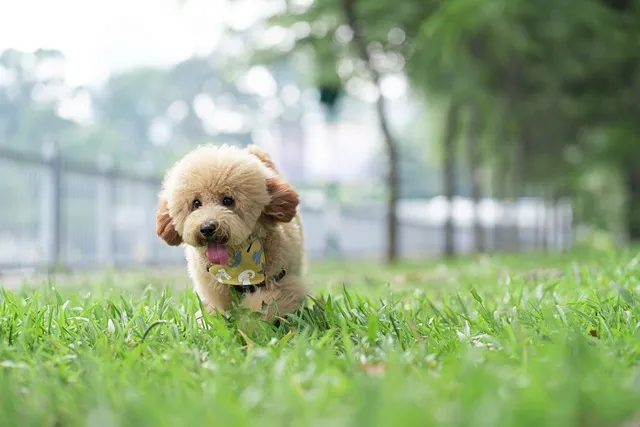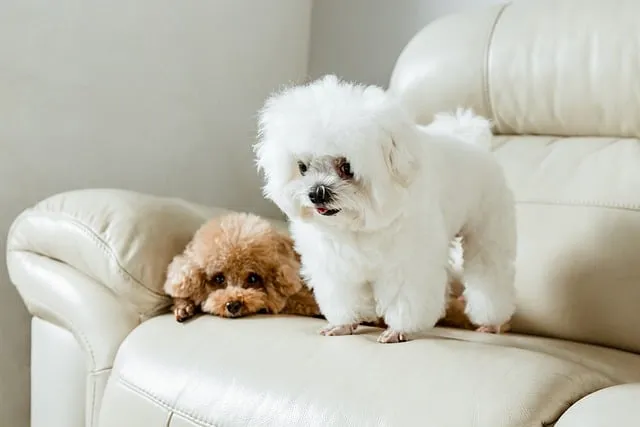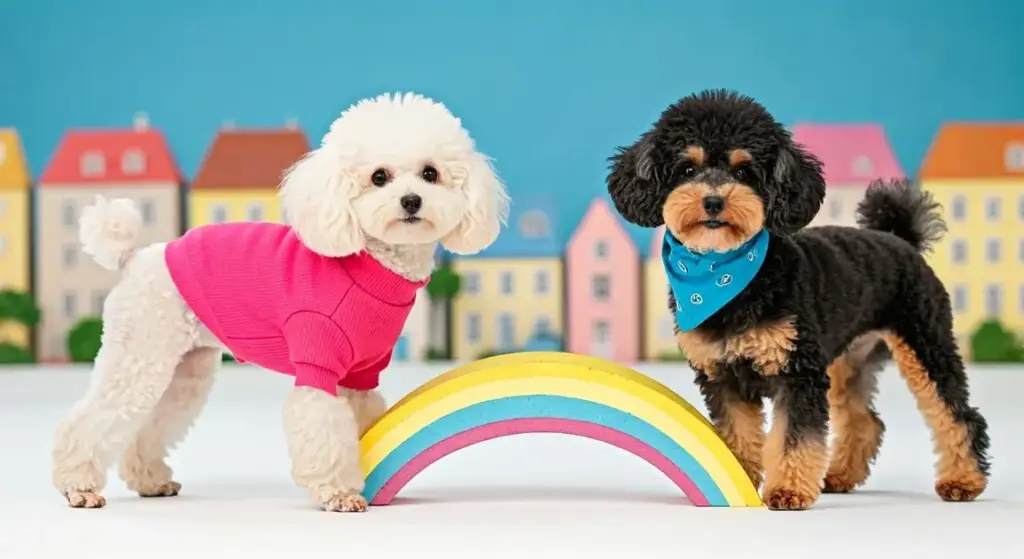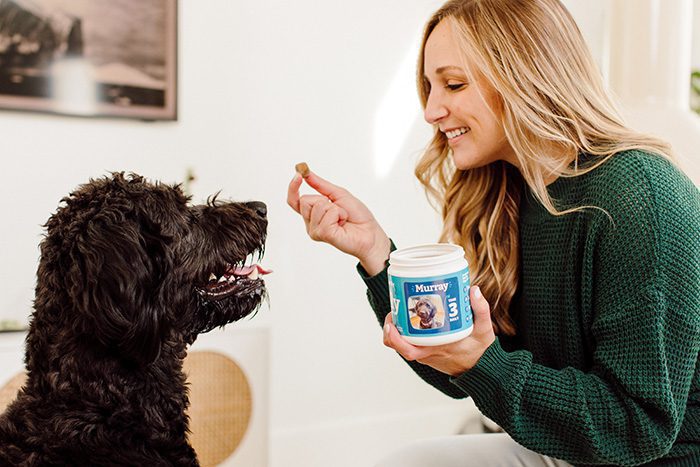Whether it’s ethical to treat toy poodles as accessories rather than as pets is sparking significant discussion, This debate is particularly relevant today, given their popularity on social media and among celebrities, often seen in designer bags or chic outfits.
This issue is urgent as toy poodles are increasingly viewed as status symbols, potentially impacting their welfare.
With their adorable appearance, it’s easy to overlook their needs, making it crucial to explore the ethical implications now.
From red carpets to social media feeds, toy poodles are becoming the latest must-have accessory for celebrities and influencers, carried in designer bags and flaunted online.
But is this fair to the dogs? The ethical debate surrounding toy poodles as pets-as-accessories is intensifying, and this blog post will explore both sides of the argument, examining what it means for their welfare and our responsibilities as pet owners.
Toy Poodle A Working Dog in Disguise
- The Original Job Description: Early Poodles (from the German Pudel, meaning “to splash”) retrieved waterfowl for hunters. Their iconic curly coat wasn’t a fashion statement—it protected joints from icy waters while allowing freedom of movement.
- Size Matters, Differently: Standard Poodles weigh up to 70 pounds. Smaller versions emerged not for cuteness but practicality: nimble “toy” variants flushed birds from dense thickets where larger dogs couldn’t tread.
Aristocratic Alchemy: How Royalty Rewrote Their DNA
By the 18th century, the European nobility became obsessed with miniaturization—a symbol of wealth and control over nature.
Breeders in France and Germany began selectively shrinking Poodles, prioritizing delicate features over working traits.
- Marie Antoinette’s “Sleeve Dogs”: The doomed queen popularized carrying these tiny Poodles in oversized sleeves, cementing their association with extravagance.
- The Lapdog Loophole: While hunting dogs faced taxes in parts of Europe, “companion animals” did not. Many aristocrats conveniently reclassified their Poodles to avoid fees.
The Industrial Revolution’s Unlikely Impact
As urbanization spread, the breed’s fate pivoted again:
- Middle-Class Aspirations: Factory owners seeking social clout adopted the dogs as living proof they’d “arrived.”
- Circus Stars Rise: Their intelligence and trainability made them circus darlings, further divorcing public perception of their rugged roots.
A 1792 German engraving depicts a powdered-wig noble with a Poodle at his feet—but hidden in the background, a servant scrubs mud from the dog’s paws. Even then, the tension between utility and vanity simmered.
Why This History Matters Today
Understanding this journey from hunter to handbag accessory reveals a sobering truth: we’ve always reshaped these dogs to fit human whims.
The “accessorizing” debate isn’t new—it’s a 300-year-old pattern reaching its peak in the social media era.

When Instagram Likes Outweigh Welfare
Picture this: A caramel-colored pup with neon-pink paws prances across a TikTok screen, her coat dyed to match her owner’s latest nail art.
The video goes viral, racking up millions of views. But off-camera, the dog scratches relentlessly at her irritated skin. This is the paradox of the 21st-century “accessory dog”—where aesthetics often eclipse well-being.
The Social Media Machine: Fame at What Cost?
Platforms like Instagram and TikTok have turned compact canines into living props. While some creators responsibly showcase training or bonding, others prioritize novelty over welfare:
- Dye Jobs Gone Wrong: Semi-permanent pet-safe dyes exist, but many resort to human-grade products containing ammonia and peroxides. A 2022 study in the Journal of Veterinary Dermatology found that 68% of dyed dogs developed skin inflammation.
- Restrictive Outfits: Tutus and sweaters seem harmless until they impede movement. Veterinarians warn that tight clothing can reduce airflow by 40%, raising body temperature dangerously during the summer.
- The “Teacup” Trap: Breeders capitalize on the demand for “pocket-sized” pets, producing pups prone to fragile bones and organ defects.
Yet it’s not all doomscrolling. Responsible influencers are flipping the script:
- @PoodleProdigy shares enrichment ideas like scent-work games in bathtubs (a nod to their water-retrieving roots).
- #UnshavedPoodles challenges extreme grooming, celebrating natural curls.
The Vanity-Veterinary Divide: What the Experts Say
Dr. Lila Chen, a veterinary behaviorist, notes a troubling trend: “We’re seeing more anxiety disorders in dogs used as photo accessories. Constant handling without consent teaches them their boundaries don’t matter.”
Key red flags owners miss:
- Whale eye (showing the whites of eyes) during photoshoots
- Repeated lip-licking or yawning in styled outfits
- Refusing treats—This is a sign of stress, not “good manners.”
Striking a Balance: Enjoyment Without Exploitation
How to share your companion’s charm ethically?
- The 5-Minute Rule: Limit costume/dye sessions to under five minutes; always monitor for discomfort.
- Choice-Based Styling: Let them approach the outfit voluntarily. Offer treats if they sniff or interact with it.
- Focus on Function: Swap rhinestone collars for harnesses that support tracheal health.
Why This Matters Now
Every viral “accessory dog” video sets a precedent. When audiences reward aesthetics over agency, owners prioritize likes over their pet’s silent signals.

How Accessorizing Undermines Canine Mental Health
Beneath the glittering bows and viral fame lies a quieter crisis—one that doesn’t trend on social media but leaves lasting marks.
Imagine a once-curious pup who now cowers at the sight of a hairbrush or a dog who retreats under furniture when cameras appear. These aren’t quirks; they’re distress signals from a mind pushed beyond its limits.
The Science of Stress in Compact Companions
Research reveals that smaller breeds process environmental stressors differently than larger dogs. A 2023 University of Helsinki study found that dogs subjected to frequent cosmetic alterations exhibited cortisol levels 32% higher than those in low-grooming households.
For dogs bred to be hyper-attuned to human emotions, constant styling can feel like relentless micromanagement.
Hidden Trauma Signs Most Owners Miss:
- Avoidance Behaviors: Turning away from accessories or hiding after grooming sessions.
- Appetite Shifts: Refusing treats post-photoshoots (often misread as “fullness”).
- Over-Grooming: Excessive licking of paws or legs, a self-soothing mechanism.
Case Study: The Rescue Who Reclaimed His Autonomy
Meet Mochi, a four-pound apricot-coated survivor rehomed twice before age two. His first owner, a lifestyle influencer, documented daily outfit changes but didn’t notice when Mochi stopped playing. After the rescue, behaviorists used choice-based rehabilitation:
- Offered two bowls (one with a costume nearby, one without).
- Used puzzle feeders to rebuild confidence in decision-making.
Within six months, Mochi initiated play with toys—a milestone his previous owners never saw.
Breaking the Cycle: 3 Strategies to Restore Agency
- The “Two Yeses” Rule: Only proceed with styling if the dog approaches and remains relaxed during touch.
- Stress-Free Zones: Designate a room/area where cameras and accessories are banned—a sanctuary for decompression.
- Natural Reinforcement: Reward calm behavior with sniff walks (their version of a mental “reset button”).
Why Size Doesn’t Diminish Suffering
A common myth suggests tiny dogs are “less aware” of their treatment. However, neuroimaging studies show all dogs, regardless of size, share similar brain structures for processing anxiety.
The difference? Smaller breeds often lack the physicality to escape overwhelming situations, leading to learned helplessness—a state where they stop trying to avoid distress.
The Path Forward
Mental scars don’t heal with viral fame or apologies. They mend through consistency: respecting boundaries, observing silent cues, and remembering that behind every adorable accessory is a living being wired for more than our amusement.

Celebrating Your Companion Without Compromise
Imagine a world where “adorable” isn’t measured by bows or designer outfits but by the spark of curiosity in a dog’s eyes as they solve a puzzle toy or the confident trot of a pup who knows their boundaries are respected.
This isn’t a fantasy—it’s the heart of ethical companionship, where charm stems from authenticity, not aesthetics.
The Art of Natural Beauty: Beyond the Grooming Table
While polished looks dominate social feeds, embracing a dog’s innate traits fosters deeper bonds:
- Curls with Purpose: Their signature coats evolved to repel water, not just turn heads. Weekly brushing sessions can double as bonding time if paired with gentle massages that reduce stress.
- Ears That Listen: Instead of tying bows, celebrate their expressive ears—perked in curiosity and relaxed during cuddles. These subtle shifts communicate more than any accessory.
Pro Tip: Photograph your dog during play or rest, capturing candid moments that reveal their true personality.
Enrichment Over Extravagance: 3 Ways to Honor Their Heritage
- Water Retrieval Revival: Fill a kiddie pool with floating toys. Even apartment-sized pups retain instincts to “fetch” from water, channeling centuries-old skills.
- Nose Work Adventures: Hide treats in cardboard boxes or snuffle mats. Their sharp scent detection, once used for hunting, thrives when challenged.
- Agility Lite: Create mini obstacle courses using couch cushions and broomsticks. It builds confidence without the pressure of competition.
The Rise of the “Imperfect” Influencer
A growing niche of pet accounts rejects curation for raw authenticity:
- @WrinklesAndAll showcases a senior rescue’s graying muzzle and love for naps, amassing 200K followers drawn to unfiltered joy.
- #MessyPlay trends among trainers advocating for dirt-digging sessions in controlled spaces, arguing that mud-streaked fur signals a happy, engaged dog.
Debunking the “High-Maintenance” Myth
Contrary to popular belief, prioritizing well-being over appearances simplifies care:
- Less Grooming Drama: Dogs are allowed to have natural coat cycles, develop fewer mats and skin issues.
- Stronger Recall: Companions treated as partners, not props, often respond better to commands, having built trust through mutual respect.
The New Cute Standard
The true charm lies not in how a dog looks but in how they live—exploring, problem-solving, and thriving on their terms.
By shifting focus from vanity to vitality, we honor their legacy as resilient, intelligent beings, not accessories.
How Advocacy Reshapes the Future of Companionship
In 18th-century France, a group of hunters revolted against the aristocracy’s obsession with miniaturizing skilled water dogs.
They argued that reducing working breeds to ornaments undermined their purpose—a debate that echoes today in modern advocacy circles.
The battle for ethical ownership isn’t new, but its tools have evolved from parchment petitions to viral hashtags.
Lessons from History: When Advocacy Changed the Breed
- The 1920s Backlash: After decades of extreme size reduction, breed clubs rallied to standardize healthier weights, preventing lethal fragility.
- Circus Boycotts: Early animal rights groups exposed forced performances, shifting public perception from “entertainers” to sentient beings.
These victories show that change is possible when passion meets strategy.
Modern Champions: Organizations Leading the Charge
A new wave of advocates combines science with storytelling:
- Paws for Autonomy: This nonprofit trains shelters to identify dogs traumatized by influencer homes using behavior-based rehab plans.
- The Ethical Grooming Alliance: Their certification program educates stylists on stress-free techniques, banning harmful practices like tight elastic bands.
Your Role in the Revolution: 4 Steps with Immediate Impact
- Vote with Your Wallet
- Support breeders who prioritize health testing over coat color trends.
- Boycott pet stores linked to puppy mills; adopt from rescues specializing in rehoming retired “content dogs.”
- Amplify Ethically
- Share posts highlighting natural behaviors (e.g., sniffing, foraging) over styled appearances.
- Tag brands that exploit small breeds in ads, urging them to feature responsibly trained animals.
- Educate Tactfully
- When a friend shares a concerning viral video, comment: “Cute! Did you know letting dogs choose outfits reduces stress?”
- Host DIY toy-making workshops to shift focus from aesthetics to enrichment.
- Advocate Systemically
- Petition local lawmakers to ban cosmetic alterations like tail docking, still legal in many regions.
- Push for social media platforms to add “ethical treatment” disclaimers on pet influencer accounts.
The Road Ahead: Metrics That Matter
Success isn’t just about likes—it’s measurable shifts:
- Rising search volumes for “stress-free grooming” (+210% since 2020).
- Increased adoptions of senior dogs from breed-specific rescues.
- More veterinary schools are offering courses on “social media-related anxiety.”
The Final Bark
True advocacy isn’t a moment but a moment. Every choice—from sharing a video to selecting a breeder—ripples across the community.
By honoring their past as capable, resilient beings, we forge a future where companionship means partnership, not possession.
Conclusion
As we reflect on the journey from royal courts to viral fame, one truth stands clear: the bond between humans and their compact companions is as complex as it is beautiful.
The Toy Poodle, once bred for its intelligence and resilience, now faces a world where its worth is often measured by aesthetics rather than ability. But change is within reach—and it starts with us.
The Power of Small Shifts
Every decision we make—whether it’s choosing a breeder, sharing a video, or simply letting our Toy Poodle choose their adventures—adds up. Consider this:
- A single post celebrating natural behaviors can inspire thousands to rethink their approach.
- Supporting ethical businesses sends a message that welfare trumps trends.
- Educating others creates a ripple effect, transforming communities one conversation at a time.
A Legacy Worth Honoring
The Toy Poodle carries centuries of history in its curls and quirks. Once hunters, performers, and confidants, these dogs ask for nothing more than the chance to be themselves—curious, playful, and unapologetically authentic.
By honoring their past, we pave the way for a future where every wagging tail tells a story of respect, not restraint.
The Final Thought
In a world obsessed with appearances, the most radical act is to see beyond the surface. To recognize that behind every styled photo or viral video is a living, breathing Toy Poodle with its own needs, desires, and dreams.
By embracing this truth, we don’t just change how we care for our companions—we redefine what it means to love them.



